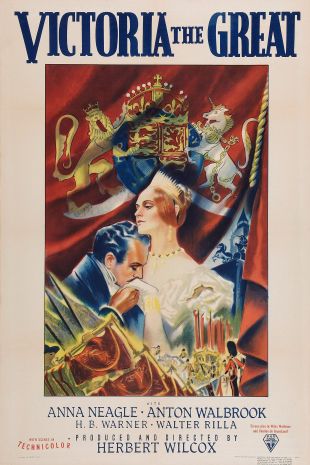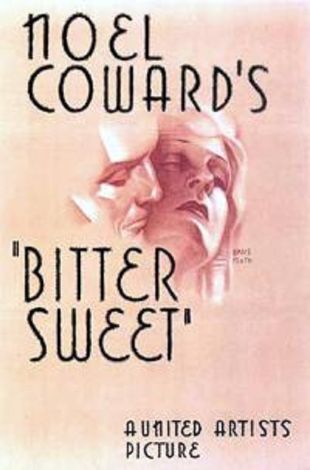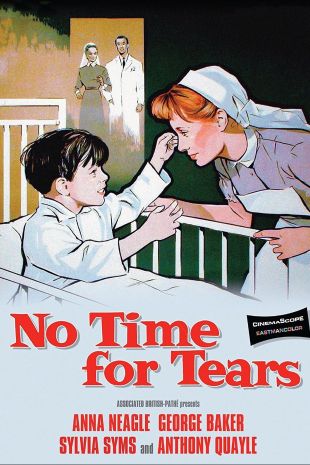Dame Anna Neagle was a theatrical and cinematic institution in England, and one of the most popular screen actresses of the mid-20th century. As the wife of producer/director Herbert Wilcox, she was also personally close to the centers of power in 1930s British cinema. Born Florence Marjorie Robertson at Forest Gate (near London) in 1904 to a merchant navy captain and his wife, Neagle took up dancing as a child. As early as age 13, she was getting offers of professional engagements, and made her formal debut when she was 20 as a member of the chorus in two 1925 Charlot revues. She moved up the pecking order of theaters and productions, emerging in London in the work of producer Charles B. Cochran as a Cochran Young Lady, and graduated from dancer to actress in 1929. Using the name Anna Neagle (the surname from her mother's family), she played opposite Jack Buchanan in Stand Up and Sing, which ended up running a then huge 604 performances.
Photographing extremely well, Neagle was a natural for the screen, and following two minor film appearances early in the sound era, she won the lead in Goodnight Vienna (1932), produced and directed by Herbert Wilcox. After her starring role in The Flag Lieutenant that same year, directed by (and starring) Henry Edwards, she worked exclusively under Wilcox's direction in film for the remainder of her career. It was a winning and happy partnership, yielding an enviable string of popular dramas -- both contemporary (Bitter Sweet) and period (Nell Gwyn) -- that endeared Neagle to British filmgoers throughout the 1930s and '40s. She also proved her stagecraft in 1934, when she took on the roles of Rosalind in As You Like It and Olivia in Twelfth Night; working under director Robert Atkins, she earned critical accolades in both productions, despite the fact that she had never before done any Shakespeare. Neagle's career during the '30s was concentrated on the screen, however, and she moved from success to success, reaching the pinnacle of her film career portraying Queen Victoria in a pair of historical epics. The first of these, Victoria the Great (1937), shot in color, enjoyed an unprecedented run of nearly a year in London, and, along with its companion film, Sixty Glorious Years (a reference to Victoria's reign that, as it turned out, very nearly could have applied equally well to Neagle's own career), proved unusually popular in America, as well. At the same time that those movies were spreading an image of Neagle (under heavy makeup to portray her character's aging) as the renowned British queen, she was delighting audiences in London with her portrayal of the title role in Peter Pan.
The two Queen Victoria biographies were successful enough to get Wilcox and Neagle a contract with RKO Radio Pictures, and they moved to Hollywood at the end of the '30s. There they made a trio of notable screen versions of musicals -- Irene, No, No, Nanette, and Sunny -- as well as the biographical drama Nurse Edith Cavell. Their professional relationship was transposed to the personal in 1943, when Neagle and Wilcox returned to England and were married. They resumed their screen work after World War II, and, over the next five years, enjoyed a string of movie successes that made their money almost exclusively in England: I Live in Grosvenor Square, Piccadilly Incident, The Courtneys of Curzon Street, Spring in Park Lane, Elizabeth of Ladymead, and Maytime in Mayfair, most of which starred Michael Wilding, a promising young leading man who achieved stardom working opposite Neagle. In 1950, she broke with her string of light romantic comedies by playing the title role in Odette, a serious, fact-based drama about a woman who sacrifices her life as a spy for the British during World War II; it, too, was a success and only added to Neagle's professional renown. She played Florence Nightingale in The Lady With a Lamp (1951) and returned to theatrical work in 1953 with The Glorious Days, which had a run of 476 performances, a major success by the standard of the day.
Neagle's fortunes declined during the mid-'50s, along with the popularity of her films, although she did enjoy some success as a producer in her own right with a trio of movies starring Frankie Vaughan. Her career in the early '60s was blighted by Wilcox's bankruptcy in 1964, but she made a comeback the following year in the West End musical Charlie Girl, which ran for six years and 2,047 performances. It was casting from life, with Neagle playing the role of a former Cochran Young Lady who marries a peer of the realm. It earned the actress an entry in the Guinness Book of World Records for her enduring popularity and was a fitting capstone to the first 40 years of her career, though she continued working for another two decades. During the show's six-year run, Neagle was made a Dame of the British Empire in 1970 in recognition of her work. Two years after Charlie Girl -- which she also brought to Australia and New Zealand -- Neagle was asked to appear in a revival of No, No, Nanette, which she'd done onscreen three decades earlier. Replacing Celia Johnson in The Dame of Sark, she was again on-stage in 1975, and the year after her husband's death in 1977, she was acting in Most Gracious Lady, which was written for the Silver Jubilee of Queen Elizabeth II. Neagle was still working in 1986, just a few weeks before her death at the age of 81.


